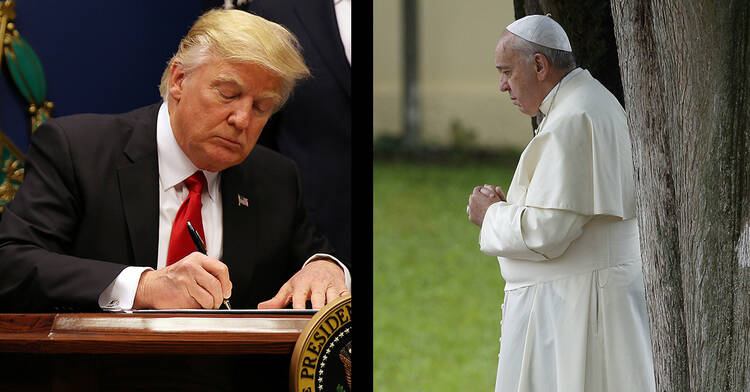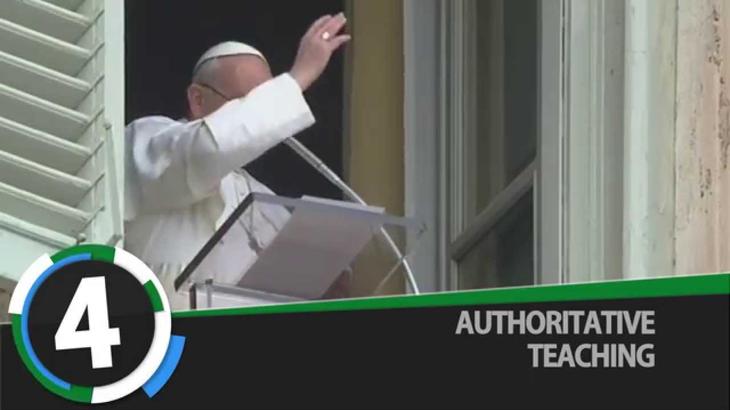President Donald J. Trump’s executive order to repeal key policies meant to curb global warming is a direct contradiction of Catholic social teaching on caring for the environment.
The order, signed at the Environmental Protection Agency on Tuesday, reverses policies set by the Obama administration and opposes Pope Francis’ core teachings on environmental protection. The move extends Mr. Trump’s “America First” stance to make the country energy independent and diminishes Obama’s vision of the United States as a global advocate for clean energy.
Protecting American jobs is more important than protecting the environment, a senior administration official said during a press briefing on Monday. “The president has been very clear that he’s not going to pursue climate or environmental policies that put the U.S. economy at risk,” the official said.
Mr. Trump’s executive actions include measures that would make the United States unable to meet the standards set in the 2015 Paris Climate Agreement to curb greenhouse gas emissions, an agreement ratified by 141 countries and supported by Pope Francis.
The moratorium on coal mining on federal lands was also lifted. All rules or regulations seen as “impediments” or “burdens” to American energy production will be reviewed. Such policies “simply don’t reflect the president's priorities,” the official said, adding the president will deal with climate change his own way. During a 2015 interview with Hugh Hewitt, Mr. Trump said: “I’m not a believer in global warming. And I’m not a believer in man-made global warming.” The president has yet to clarify his position.
"There are too many special interests, and economic interests easily end up trumping the common good and manipulating information so that their own plans will not be affected.”
—Pope Francis
Pope Francis’ landmark encyclical, “Laudato Si’,” outlined the moral case for caring for the environment. It called upon not only Catholics but all people of goodwill to enter into a dialogue about our common home. In the encyclical, Francis berates what he calls “weak responses” to the mistreatment and degradation of the earth. He writes: “It is remarkable how weak international political responses have been…. There are too many special interests, and economic interests easily end up trumping the common good and manipulating information so that their own plans will not be affected” (No. 54).
We rounded up America’s extensive coverage and analysis of the pope’s “green encyclical,” which introduced environmentalism to the body of Catholic social teaching and gives context to Catholics evaluating the recent actions of the Trump administration.Top Ten Takeaways from "Laudato Si'''
By James Martin, S.J.
Pope Francis’ revolutionary new encyclical calls for a “broad cultural revolution” to confront the environmental crisis. “Laudato Si” is also quite lengthy. Here are the main messages, or “takeaways” of this encyclical on our common home Read more.
"Laudato Si'" Joins the Tradition of Catholic Social Teaching
By Kevin Clarke
Pope Francis wants it clear that his first encyclical is to be appreciated as an addition to the church’s 124 year tradition of Catholic Social Teaching. How do we know? He tells us so right there at the beginning in number 15: “It is my hope that this Encyclical Letter, which is now added to the body of the Church’s social teaching [my italics], can help us to acknowledge the appeal, immensity and urgency of the challenge we face.” Read more.
Why "Laudato Si'" is the Perfect Encyclical for Millennials
By Kerry Weber
“Laudato Si’” is a hopeful document in which Francis asks all people to enter into a “new dialogue about how we are shaping the future of our planet” (No. 14), and he draws on the wisdom of Scripture, bishops, philosophers and science to shape that conversation. But, perhaps most surprisingly, he also points to the example of young people today: “Young people demand change. They wonder how anyone can claim to be building a better future without thinking of the environmental crisis and the sufferings of the excluded” (No. 13). Read more.
"Laudato Si'": A 'Map'
Ready to read the encyclical for yourself? The Vatican Press Office has provide a useful guide to the development and major themes of the document. For each of the six chapters, there is a one-page summary that gives the argument or main points and some key passages. You can find the map here.
You can find all of America’s coverage of "Laudato Si’" here.










.My comment and a reply to my comment were deleted so I will rephrase my comment.
Is this true? Or is it just rhetoric that makes Donald Trump look bad? There is more discussion of this topic on the article published by Fr. Martin. (http://www.americamagazine.org/faith/2017/03/29/father-james-martin-why-climate-change-moral-issue#comment-87144) This issues surrounding this topic are not very clear and should be extensively debated. The science is definitely not settled.
Commentators on 'climate change' ought to be first vetted for the level of their scientific education before acceptance for printing so that America's readership can be spared from seeing cognitively barren submissions such as the two exhibited above sent in two days ago.